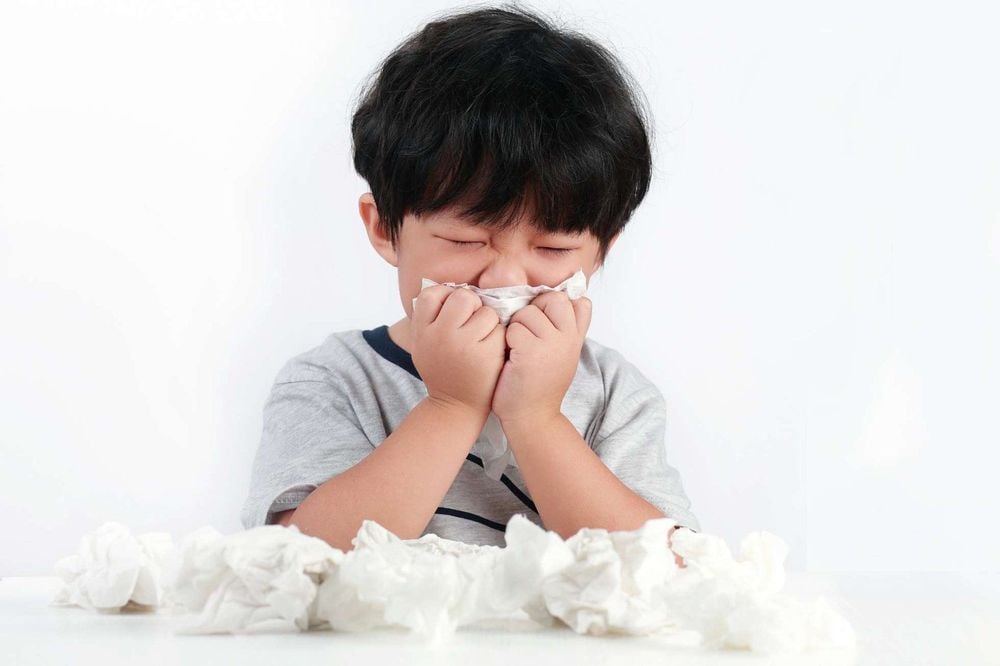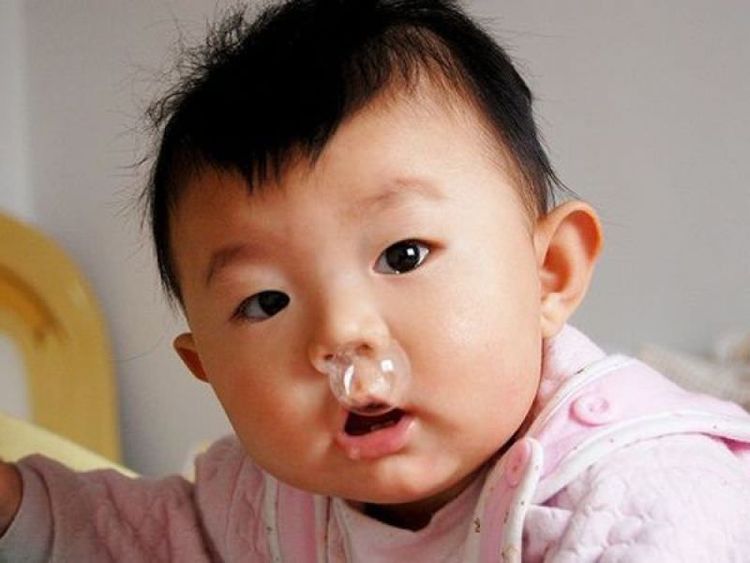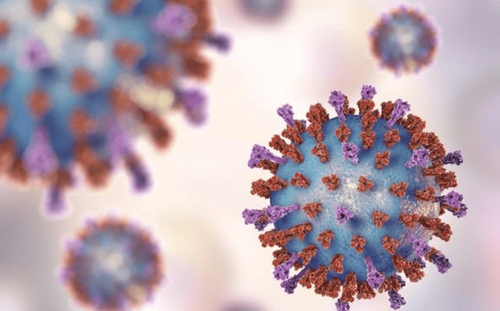This is an automatically translated article.
The article is professionally consulted by Master, Doctor Ngo Thi Oanh - Pediatrician - Pediatrics - Neonatology - Vinmec Ha Long International HospitalRSV, also known as respiratory syncytial virus, is one of the causes of pneumonia in infants and young children with the ability to spread very strongly. Currently, there is no vaccine to prevent this virus. So how does the RSV virus spread and when is the RSV test done?
1. What is RSV pneumonia virus?
RSV (respiratory syncytial virus) or respiratory syncytial virus is the leading cause of bronchiolitis, pneumonia in infants and children under 2 years of age.RSV pneumonia virus has symptoms similar to common viral flu in most cases, only a few children infected with RSV virus pneumonia develop severe symptoms of shortness of breath, wheezing, affecting quite a lot. serious for children's health.
Respiratory syncytial virus (RSV) is an RNA virus and a leading cause of lower respiratory tract infections in young children. Currently, RSV pneumonia virus is classified into 2 types A and B. Characteristic of this virus is that it causes seasonal illness, infants and children under 2 years of age are the main infectious subjects.
RSV pneumonia can be reinfected because the immune response to this virus does not provide long-term protection. The chance of developing lower respiratory tract infections is up to 40% of those exposed to RSV.
It is worth noting that even though antibodies against RSV do not last long, it helps to reduce the severity of the disease. A statistic in the US shows that the pneumonia RSV virus is the main cause of more than 50,000 hospital admissions every year in children under 5 years old.
RSV infection has varying degrees of severity, from asymptomatic to mild cases and potentially severe progression to bronchiolitis and pneumonia. RSV pneumonia can occur all year round, however, epidemics caused by RSV virus usually peak during the rainy season in the southern provinces or the cold season in the northern provinces. In temperate countries, outbreaks occur in winter or early spring each year.

Virus RSV viêm phổi thường gặp chủ yếu ở mùa đông
2. How does RSV virus spread?
How RSV virus is transmitted is a matter of great concern, from the way of infection, measures to prevent diseases caused by this virus will be proposed. The routes of RSV infection can include:The main way of transmission is the respiratory tract, when a child carrying the virus coughs, sneezes... will release a quantity of RSV virus into the air, they will attack the body through the eyes, nose, mouth to cause disease to others; RSV virus can be transmitted through direct contact with the source of the disease such as: shaking hands, playing with toys... Accordingly, parents need to pay attention to measures to prevent RSV pneumonia virus for children:
Hygiene clean, wash hands often for children during the sick season. Especially when children come into contact with children with flu symptoms ; Clean surfaces of household items that can be a source of infection; Limit your child's contact with strangers. Adults should wash their hands before holding hands or holding children; Limit going to crowded places during the rainy or cold season; Do not leave children near people who are smoking or in environments with tobacco smoke; If possible, parents should isolate their child from other children, including those showing signs of flu. Adequate nutrition, should be breastfed until 2 years old if possible. Keep the child warm, clean the living environment around the child; When it is necessary to go out in the cold season, parents should keep warm and take measures to protect the child's respiratory system such as wearing a mask, cleaning eyes, nose and mouth with physiological saline after returning home; Special attention should be paid to children with frequent respiratory diseases or congenital heart disease. If the child is found to have signs of respiratory infection such as fever, cough, difficulty breathing, etc., the child should be taken to the hospital for prompt treatment.

Rèn thói quen đeo khẩu trang cho trẻ để bảo vệ hệ hô hấp
3. When is the test to detect RSV virus?
RSV virus test is very necessary in some pediatric patients, currently there are 2 main methods to detect RSV pneumonia virus:
RSV rapid test: This is a qualitative test to detect respiratory syncytial virus antigens respiratory tract infection (RSV) in young children; Real-time PCR RSV: The viral gene sequence amplification reaction is the most accurate test to detect RSV virus in the child's body. Samples for RSV virus testing:
3.1. Nasal secretions
Have the patient sit comfortably with the neck slightly tilted back; Insert a cotton swab into the nose parallel to the roof of the mouth and hold the swab in place for a few seconds; Remove the cotton swab by gently twirling it during the withdrawal process; Do the same with the other side of the nose with another cotton swab; Place both in the sample container and close the lid.

Để xét nghiệm virus RSV có thể sử dụng dịch tiết mũi của trẻ
3.2. Translation of the pharynx
Have the patient sit comfortably with the neck slightly tilted back; Insert a soft cotton swab into the nose, when the hand feels light touching the back of the throat, rotate the cotton swab in two directions and then gently pull it out; Do the same for the other side of the nose; Place both in the sample container and close the lid.
3.3. Nasopharyngeal lavage fluid
Pump about 2ml of physiological saline into one nostril, do not let the patient swallow and do it with both nostrils; Collect wash solution into a plastic cup; Add the wash solution to the transport medium to the laboratory. Currently, Rapid Antigen Testing method is the test applied in most medical facilities with a sensitivity of 80-90% and a specificity of over 90%. However, RSV tests do not carry much significance because diagnosis and treatment are mainly based on the clinical presence of the patient.
The biggest benefit of RSV virus testing is to detect and isolate positive patients to reduce the possibility of disease spreading into an epidemic. Therefore, only some high-risk subjects should be tested for RSV virus and when the results are positive, patients will be prescribed ribavirin.

Tiến hành rửa dịch mũi cho trẻ để loại bỏ dịch nhầy
4. Who should be tested for RSV virus?
When the patient has a history of exposure to the source and has signs of suspicion of RSV pneumonia infection, it is necessary to go to medical facilities for diagnosis. Some subjects at high risk of RSV infection need to be tested:Premature babies with weak or incomplete immune systems; Newborn or infant 1 to 2 months old. Children with congenital heart disease, recurrent respiratory infections; Malnourished children ; Older adults, history of heart disease, cancer or HIV infection; People with a history of chronic respiratory diseases such as asthma, chronic obstructive pulmonary disease (COPD) or smokers... RSV virus is a dangerous virus that can cause many respiratory diseases. aspiration in children. However, there is currently no vaccine against this virus and no specific treatment for RSV-infected patients.
Therefore, in order to protect children's health and help them develop comprehensively, improve their resistance, in addition to maintaining appropriate nutrition, parents should equip themselves with knowledge about respiratory diseases. Respiratory infections are common in children as well as RSV testing methods, in order to have a treatment plan and take the child to medical centers for specialist doctors to examine and assign tests when necessary.
Vinmec International General Hospital is the address for receiving and examining respiratory diseases that infants and young children are susceptible to: viral fever, bacterial fever, respiratory infection, pneumonia in children, ... with modern equipment, sterile space, minimizing the impact as well as the risk of disease spread. Along with that is the dedication from the doctors with professional experience with pediatric patients, making the examination no longer a concern of the parents.
Please dial HOTLINE for more information or register for an appointment HERE. Download MyVinmec app to make appointments faster and to manage your bookings easily.













